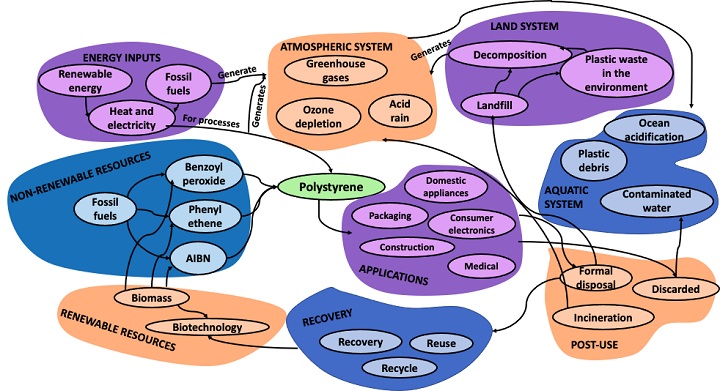Integrating systems thinking into chemistry education
Undergraduate student research investigating staff perceptions of a ‘systems thinking’ approach in chemistry education indicates it is viewed positively. In particular, the systems thinking approach has potential advantages in providing benefits to student learning, facilitating interdisciplinary teaching/learning, and enhancing student employability – ultimately leading to societal benefits.
A ‘systems thinking’ theoretical framework for learning chemistry has the potential to help students transition from a surface-level, reductionist understanding of subject knowledge to a more integrated approach to learning. Systems thinking aims to encourage students to explore complex inter-relationships between different aspects to gain a deeper understanding of the fundamental chemistry (see figure for an example).

Systems Oriented Concept Map Extension (SOCME) for polystyrene showing how the production and use of this material integrates into a variety of different systems.
Systems thinking has the potential to equip the next generation of scientists, engineers and policymakers to tackle global challenges such as the United Nations Sustainable Development Goals (UN SDGs), which require interdisciplinary and multi-faceted approaches to problem solving.
Alice Jackson (MChem 2021) carried out her undergraduate research project working with Dr Glenn Hurst and the results have been published in the prestigious international journal, Chemistry Education Research and Practice.
Alice conducted semi-structured interviews with a range of academic staff from the Department of Chemistry and evaluated responses qualitatively (via the Framework method) and quantitatively (via Likert-style question). Instructors expressed positive opinions of systems thinking and believed it should be implemented into the undergraduate chemistry curriculum to some extent, offering a range of possible benefits.
Curriculum reform is only successful with support from both instructors and students and while such positive opinions of systems thinking from educators with expertise in a variety of areas within chemistry are promising, the student perspective is of critical importance for widespread integration – this will be examined going forwards.
Reflecting on the work, Dr Hurst said: ‘We have done a lot of work in recent years using systems thinking as a framework to teach green and sustainable chemistry – it is particularly exciting to learn that there is significant potential for systems thinking to be a valuable tool to teach chemistry more broadly.’
Alice and Glenn are currently collating and reporting results of the work at the Science Faculty level. Early results indicate that positive opinions of the systems thinking as an education tool are held throughout the sciences. If systems thinking was incorporated more widely throughout the sciences, this may facilitate more interdisciplinary teaching and learning, including associated research projects. This would enable grand challenges, such as those outlined by the UN SDGs, to be addressed.
Alice comments: ‘Although completing my masters project during the pandemic brought additional challenges, this project was extremely rewarding and I am very grateful that the participants were willing to take the time out of their busy and stressful schedules to take part.‘
Alice will present her research at the institutional Annual Learning and Teaching Conference and it is published in Chemistry Education Research and Practice.